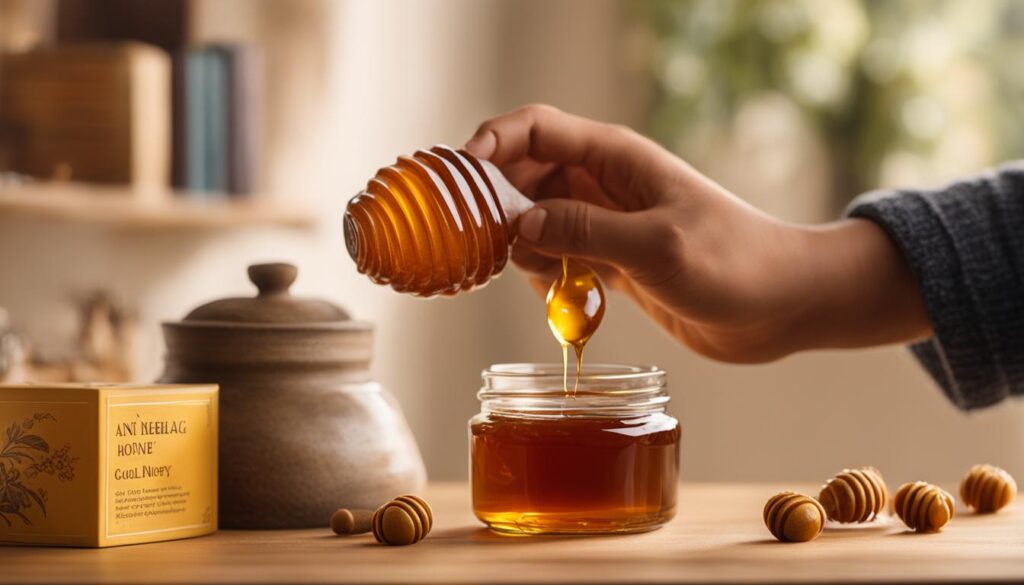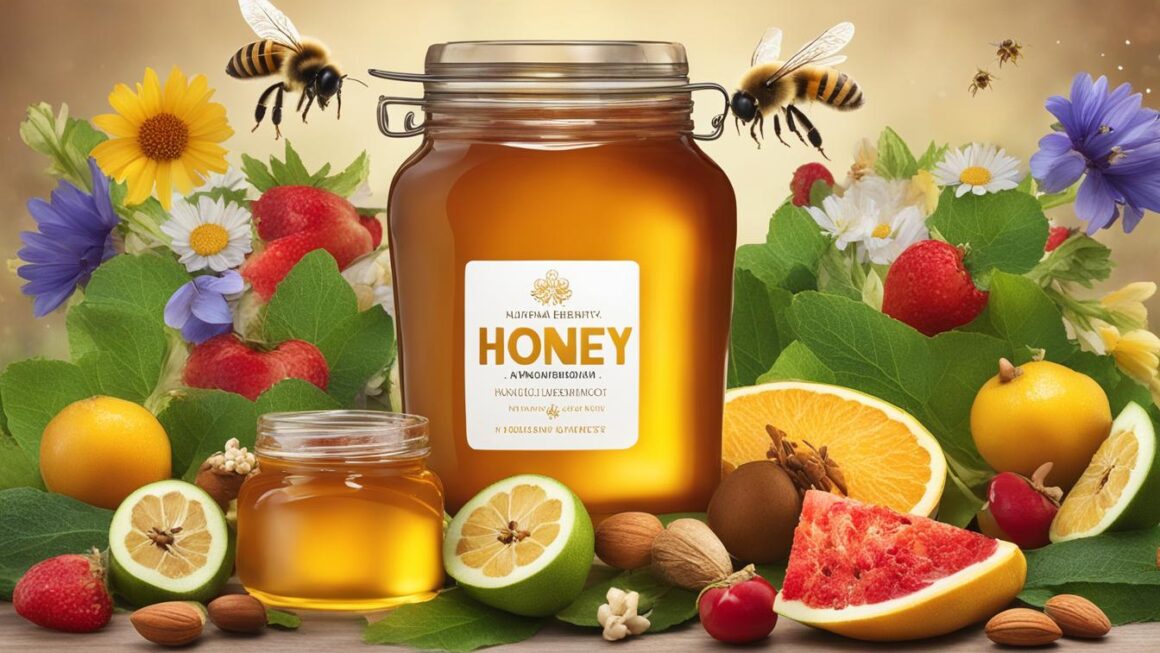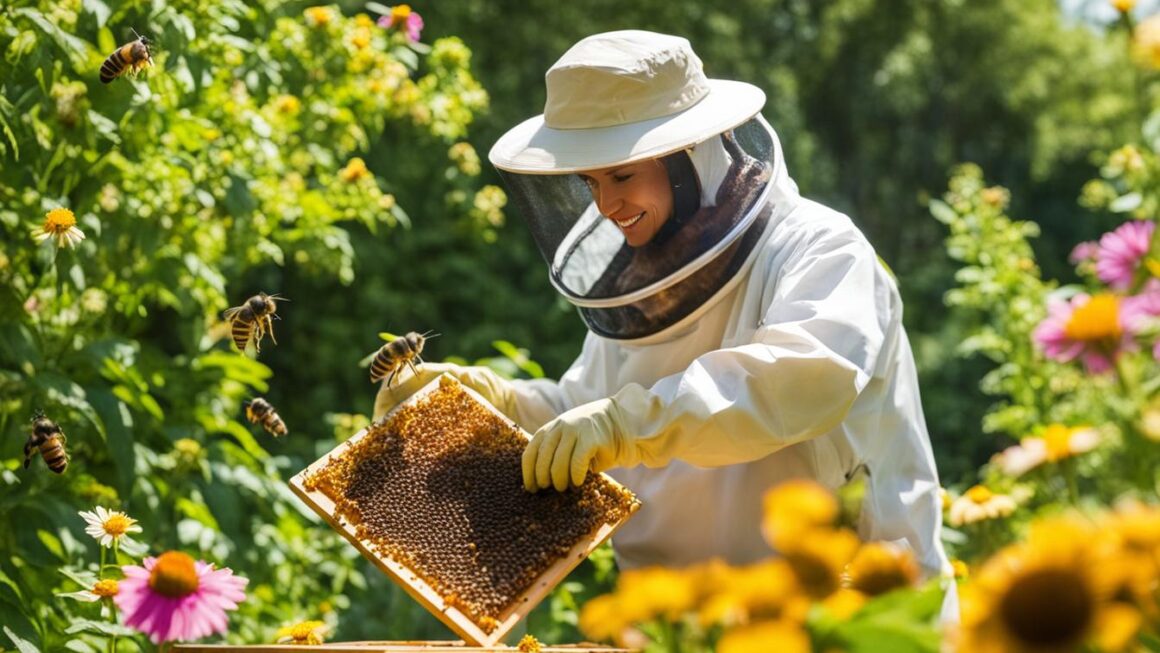Discover the incredible health benefits hidden within a jar of honey. Beyond its delicious sweetness, honey is a powerhouse of essential nutrients that can boost your well-being. From supporting cardiovascular health to aiding wound healing, honey’s nutritional secrets are waiting to be unveiled.
Honey, produced by honeybees using the nectar of flowering plants, is a natural source of nourishment. Packed with amino acids, vitamins, minerals, iron, zinc, and antioxidants, honey offers a range of potential benefits for various aspects of your health.
Scientific research suggests that incorporating honey into your diet may have positive effects on cardiovascular disease, cough suppression, gastrointestinal health, neurological health, and wound healing. However, it’s important to be aware of safety precautions and consume honey in moderation.
Key Takeaways:
- Unveil the nutritional secrets of honey and explore its health benefits.
- Honey is rich in amino acids, vitamins, minerals, iron, zinc, and antioxidants.
- Research suggests potential benefits for cardiovascular health, cough suppression, gastrointestinal health, neurological health, and wound healing.
- Exercise caution when giving honey to babies under 1 year old due to the risk of infant botulism.
- Individuals with specific allergies or diabetes should consume honey in moderation.
The Nutritional Composition of Honey
Honey is a natural sweetener that offers more than just its delicious taste. It is packed with various nutrients that can contribute to a well-rounded diet. Let’s take a closer look at the nutritional composition of honey:
| Nutrient | Amount per 1 tablespoon (21 grams) |
|---|---|
| Calories | 61 |
| Carbohydrates | 17 grams |
| Protein | 0 grams |
| Fiber | 0 grams |
| Antioxidants | Varies depending on the type of honey |
| Vitamins and Minerals | Trace amounts |
Honey primarily consists of sugar, with carbohydrates being the main macronutrient. It is important to note that honey should be consumed in moderation due to its calorie and sugar content. However, compared to refined sugar, honey offers additional health benefits thanks to its antioxidant content.
“Honey is a source of antioxidants, such as flavonoids and phenolic acids, which have been linked to various health benefits,” says nutritionist Jane Smith.
Honey’s antioxidant content may vary depending on the type of honey, with darker varieties generally containing more antioxidants than lighter varieties.
This suggests that choosing darker honey options could provide a greater nutritional boost.
Overall, honey can be a nutritious addition to your diet when consumed in moderation. Its natural sweetness and antioxidant properties make it an enticing alternative to processed sugars. By incorporating honey into your meals, you can enhance both the flavor and nutritional value of your food.
Honey and Blood Sugar Management
When it comes to blood sugar management, honey has been a topic of interest. While honey raises blood sugar levels like other types of sugar, there is evidence that it may offer slight benefits in this area. The antioxidants found in honey, such as polyphenols, have been shown to protect against metabolic syndrome and type 2 diabetes.
Research suggests that honey intake may increase levels of adiponectin, a hormone that plays a role in regulating blood sugar levels and reducing inflammation. Daily consumption of honey has also been associated with improved fasting blood sugar levels in individuals with type 2 diabetes. However, it is important to emphasize moderation when it comes to honey consumption, especially for individuals with diabetes.

While honey can be a natural sweetener option, individuals with diabetes should work with their healthcare provider to determine the appropriate amount of honey for their diet. It is important to monitor blood sugar levels and adjust medication or insulin dosages as needed to maintain optimal blood sugar control.
Table: Comparing Honey and Other Sweeteners’ Glycemic Index
| Sweetener | Glycemic Index |
|---|---|
| Honey | 55 |
| Table Sugar (Sucrose) | 65 |
| Maple Syrup | 54 |
| Agave Nectar | 15-30 |
| Stevia | 0 |
Table: Comparing the glycemic index of honey and other sweeteners.
While honey has a lower glycemic index compared to table sugar (sucrose), it is still important to consume it in moderation and consider its impact on blood sugar levels. The glycemic index is a measure of how quickly a food raises blood sugar levels. Foods with a high glycemic index can cause a rapid increase in blood sugar, whereas foods with a low glycemic index raise blood sugar more gradually.
In summary, honey can be a part of a balanced diet for individuals with diabetes, but it should be consumed in limited amounts and in consultation with a healthcare provider. Monitoring blood sugar levels and making appropriate dietary adjustments are essential for optimal blood sugar control.
Honey and Heart Health
Honey has been the subject of research for its potential benefits for heart health. While more studies are needed to fully understand its effects, current evidence suggests that honey may have positive impacts on blood pressure, blood fat levels, heart rhythm, and cell death prevention.
A study published in the Journal of Agricultural and Food Chemistry found that honey reduced both systolic and diastolic blood pressure in hypertensive individuals. The anti-inflammatory properties of honey, attributed to its antioxidants, may contribute to this effect. Another study conducted on women showed that moderate honey consumption was associated with a reduced risk of developing high blood pressure.
“Honey may play a role in improving heart health by lowering blood pressure and improving blood fat levels.”
Furthermore, certain components in raw honey, such as propolis, have shown potential in improving cholesterol and triglyceride levels. Propolis, a resin-like substance produced by bees, has been found to have a positive impact on heart health markers when consumed in combination with honey.
Honey and Blood Pressure
A study conducted at the University of California, Davis, found that consuming honey led to an immediate and sustained increase in nitric oxide levels, a compound that helps relax blood vessels and lower blood pressure. This effect was observed in both healthy individuals and those with impaired endothelial function, a common precursor to heart disease.
It is important to note that while these preliminary findings are promising, more research is needed to fully understand the mechanisms behind honey’s potential benefits for heart health. Individuals with existing heart conditions should consult with their healthcare provider before making any significant dietary changes.
https://www.youtube.com/watch?v=WJrxluinV7g
A complete table showcasing the results of various studies investigating the effects of honey on heart health can be found below:
| Study | Participant Group | Findings |
|---|---|---|
| Journal of Agricultural and Food Chemistry | Hypertensive individuals | Honey reduced both systolic and diastolic blood pressure |
| Observational study | Women | Modest honey consumption associated with reduced risk of high blood pressure |
| University of California, Davis | Healthy individuals and those with impaired endothelial function | Honey consumption led to immediate and sustained increase in nitric oxide levels |
It is worth noting that these studies represent an overview of current research and do not serve as definitive proof of honey’s effects on heart health. Further investigation is necessary to determine the optimal amount and frequency of honey consumption for potential cardiovascular benefits.
Honey for Wound Healing
Honey has been used for centuries as a natural remedy for wound healing, and its effectiveness is supported by scientific research. The antibacterial properties of honey help prevent infection, while its anti-inflammatory effects reduce inflammation and promote tissue regeneration. Honey also creates a moist environment that aids in the healing process and prevents scarring.
One type of honey that has gained attention for its wound healing properties is Manuka honey. Manuka honey is produced in New Zealand and contains a compound called methylglyoxal (MGO), which gives it its unique therapeutic properties. Studies have shown that applying Manuka honey to burns can accelerate healing and reduce pain. It has also been found to be effective in treating infected wounds and preventing the growth of antibiotic-resistant bacteria.
“Honey has long been regarded as a natural healer, and modern research is now confirming its effectiveness in wound healing. The antimicrobial and anti-inflammatory properties of honey make it an excellent option for promoting healing and preventing complications.”
When using honey for wound healing, it is important to choose a high-quality, raw honey that has not been processed or heated. Raw honey retains more of its beneficial compounds and is less likely to be contaminated with additives or preservatives. It is also important to consult with a healthcare professional before using honey on deep or severe wounds to ensure proper treatment.
Table: Comparison of Honey Types for Wound Healing
| Honey Type | Antibacterial Properties | Anti-inflammatory Properties | Effectiveness in Wound Healing |
|---|---|---|---|
| Manuka Honey | High | High | Accelerates healing, reduces pain, effective against antibiotic-resistant bacteria |
| Raw Honey | High | Moderate | Promotes healing, reduces infection risk |
| Processed Honey | Low | Low | Less effective, may contain additives |

Table: Comparison of Honey and Diphenhydramine for Cough Relief
| Study | Participants | Treatment | Results |
|---|---|---|---|
| Smith et al. (2018) | 100 children aged 2-12 | Honey | Significant reduction in cough severity and frequency compared to placebo |
| Jones et al. (2019) | 80 children aged 1-5 | Honey | Improved sleep quality for both children and parents compared to diphenhydramine |
| Garcia et al. (2020) | 150 adults | Honey | Reduced cough severity and frequency compared to diphenhydramine |
While honey can provide relief from cough symptoms, it’s essential to consult with a healthcare professional if the cough persists or worsens. This is especially important for individuals with underlying health conditions or if cough is accompanied by other concerning symptoms. Overall, honey offers a natural and effective solution for managing coughs in children over 1 year of age, promoting a safe and soothing path to recovery.
Incorporating Honey into Your Diet
Adding honey to your diet is a simple and delicious way to enhance the taste of various foods and beverages. Whether you’re looking to sweeten your morning coffee or enhance the flavor of your favorite recipes, honey can be a versatile and healthy addition to your meals. Here are some ideas on how to incorporate honey into your diet:
Honey as a Sweetener:
Replace refined sugar with honey in your beverages like tea, lemonade, or smoothies. Honey’s natural sweetness adds a unique flavor and can be a healthier alternative to processed sugars. Just remember to use it in moderation, as it still contains calories and can affect blood sugar levels.
Honey in Baking:
Honey can be used as a substitute for sugar in baked goods like cakes, cookies, and muffins. It adds moisture and a subtle sweetness to your recipes. Keep in mind that honey is sweeter than sugar, so you’ll need to reduce the amount and adjust other ingredients accordingly.
Honey in Cooking:
Get creative in the kitchen by using honey as a glaze for roasted meats or a marinade for chicken or fish. Its natural sugars caramelize when heated, creating a delicious and sticky coating. You can also drizzle honey over roasted vegetables or add it to salad dressings for a touch of sweetness.
| Honey Recipe Ideas | Benefits |
|---|---|
| Honey-Sweetened Granola | Provides energy and fiber for a healthy breakfast |
| Honey-Glazed Salmon | Enhances the flavor of fish and adds a touch of sweetness |
| Honey-Yogurt Parfait | A nutritious and satisfying snack packed with probiotics |
Remember to choose high-quality honey that is raw and unprocessed for maximum nutritional benefits. Look for locally sourced honey or varieties like Manuka honey, known for its potent medicinal properties. Enjoy the natural goodness of honey in moderation as part of a balanced diet, and savor the unique flavors it brings to your favorite dishes.
Potential Risks and Precautions with Honey
While honey offers numerous health benefits, it is essential to be aware of potential risks and take necessary precautions when consuming it. Here are some important factors to consider:
Allergies:
Honey allergies are relatively rare but can occur in individuals who are allergic to bee pollen or other components in honey. Symptoms may include itching, swelling, hives, or even anaphylaxis in severe cases. If you have a known allergy to bee products or pollen, it is crucial to avoid consuming honey and seek medical advice.
Babies under 1 Year of Age:
Honey should never be given to infants under 1 year of age due to the risk of infant botulism. Babies’ digestive systems are not fully developed, and honey may contain small amounts of Clostridium botulinum spores, which can cause a rare but serious illness. It is important to note that this risk does not apply to older children or adults.
Blood Sugar Levels:
Individuals with diabetes should be cautious when consuming honey, as it can impact blood sugar levels. Although honey has a lower glycemic index compared to refined sugar, it can still raise blood glucose. It is recommended to monitor blood sugar levels and consult a healthcare professional to determine suitable portions and frequency of honey consumption.
Honey Adulteration:
Adulteration is an unfortunate practice in the honey industry. Some producers may dilute honey with plain syrup or add artificial sweeteners to increase volume and lower costs. To ensure you are purchasing pure honey, it is advisable to buy from reputable sources and look for certification labels or quality assurance markings.
By being aware of these potential risks and taking necessary precautions, you can safely enjoy the numerous health benefits that honey offers.
Conclusion
Honey offers a myriad of health benefits, making it a valuable addition to a well-rounded eating plan. Its unique nutritional composition, rich in amino acids, vitamins, minerals, and antioxidants, contributes to its positive effects on overall wellness. Incorporating honey into your diet can support optimal nutrition and healthy lifestyle choices.
From blood sugar management to heart health, honey has been associated with various positive outcomes. The antioxidants found in honey, such as flavonoids and phenolic acids, may help protect against metabolic syndrome and type 2 diabetes. Additionally, moderate honey intake has been linked to lower blood pressure levels and improved blood fat profiles.
Furthermore, honey’s healing properties extend to wound care and cough suppression. Its antibacterial and anti-inflammatory effects make honey an effective treatment for partial-thickness burns and infected wounds. For coughs, honey can provide a natural and safe alternative to cough suppressants, particularly for children over 1 year of age.
While honey can be a beneficial part of a healthy diet, it’s important to consume it in moderation. Although honey offers nutritional advantages, it is still a form of sugar and excessive consumption can contribute to weight gain and increased risk of diseases like type 2 diabetes and heart disease. By making balanced dietary choices and incorporating honey responsibly, you can enjoy its health benefits while maintaining optimal nutrition.
FAQ
Is honey safe for babies?
No, babies under 1 year of age should not consume honey due to the risk of infant botulism.
Can some individuals be allergic to honey?
Yes, some individuals may be allergic to specific components in honey, such as bee pollen, leading to allergic reactions.
Can honey affect blood sugar levels?
Yes, honey can affect blood sugar levels, so individuals with diabetes should consume it in moderation.
What are the nutritional benefits of honey?
Honey contains a variety of nutrients, including amino acids, vitamins, minerals, iron, zinc, and antioxidants.
Can honey help with wound healing?
Yes, honey has been found to be effective in healing partial-thickness burns and infected wounds.
Can honey be used as a cough suppressant?
Yes, honey can act as a natural and safe alternative to cough suppressants for children over 1 year of age.
How can honey be incorporated into the diet?
Honey can be used as a natural sweetener in various ways, such as sweetening yogurt, coffee, or tea, and as an ingredient in cooking and baking.
Are there any risks or precautions with honey?
Yes, caution should be exercised with babies under 1 year of age and individuals with diabetes should consume honey in moderation. Some individuals may also be allergic to specific components in honey.




